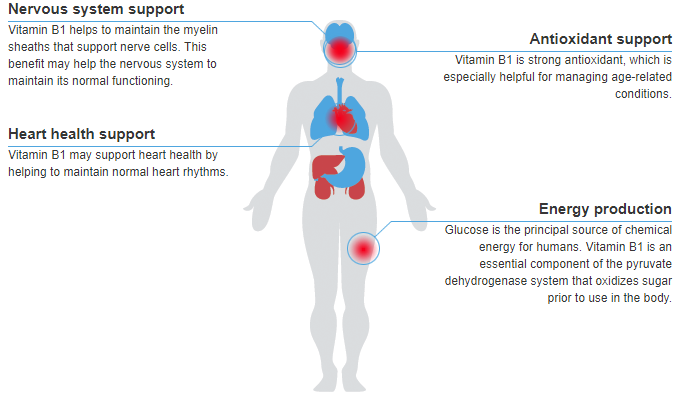Vitamin B1, also known as thiamin or thiamine, is an essential nutrient found in yeast, pork, and cereal grains that plays a crucial role in energy production, nervous system support, heart health, and antioxidant activity.
Vitamin B1 is formally known by other names such as thiamin and thiamine. Thiamin is a contraction of thio-vitamin, meaning a “sulfur-containing vitamin.” It was originally named aneurin and later classified as the first vitamin in the B group.
Thiamin is a required nutrient for all organisms. Animals must obtain it from dietary sources, although other life forms can biosynthesize thiamin. The most concentrated dietary sources of thiamin include yeast and pork. However, cereal grains typically account for the majority of thiamin intake in humans, especially brown rice, flax, oatmeal, and rye. Additional sources of thiamin include asparagus, cauliflower, kale, potatoes, and oranges.
The outer layers of the seeds contain most of the thiamine in cereal grains. These layers are removed during the refining process, so refined grains are very low in thiamin. Processed flour is often supplemented with thiamin as well as other nutrients such as folic acid, iron, niacin, and riboflavin.
Thiamine must be converted into another form before it can be used in biological processes. These forms primarily include phosphate derivatives of thiamin, especially thiamine pyrophosphate (TPP). This derivative is best-known as a coenzyme in reactions involving amino acids and sugars. Thiamine is often provided in health supplements as thiamine HCL.
Vitamin B1 provides many specific health benefits in its role as an essential nutrient. Some of its most significant benefits include energy production, support for the nervous system, heart health, and antioxidant activity.
Vitamin B1 helps to maintain the myelin sheaths that support nerve cells. This benefit may help the nervous system to maintain its normal functioning.
Vitamin B1 may support heart health by helping to maintain normal heart rhythms.
Vitamin B1 is strong antioxidant, which is especially helpful for managing age-related conditions.
Glucose is the principal source of chemical energy for humans. Vitamin B1 is an essential component of the pyruvate dehydrogenase system that oxidizes sugar prior to use in the body.

The most significant reason to take vitamin B1 is if your dietary intake is lacking. The nervous system’s reliance on oxidative metabolism means that neurological signs are the most common indications of a severe nutritional deficiency of vitamin B1. These signs primarily include beriberi, which causes movement difficulties in the limbs. Less severe cases of a vitamin B1 deficiency can cause fatigue, irritability and weight loss.
Thiamin, thiamine
Shipping calculated at checkout
